Headline News Archive
September 25, 2015 - A joint project of the Association of State Flood Plain Managers (ASFPM) and Coastal States Organization (CSO) invited Florida Sea Grant’s Thomas Ruppert to serve on a 13-person Project Advisory Committee for the project “Improving Community Resiliency through the NFIP / CRS.” The project is being funded by the National Fish and Wildlife Foundation as part of the Hurricane Sandy Coastal Resiliency Competitive Grants Program. The project’s goal is to improve participation in the FEMA Community Rating System (CRS) program by developing new tools to inspire communities to join the CRS and help participating communities enhance their score while strengthening floodplain ecosystems. The project will conduct interviews with floodplain managers and officials from communities around the United States as part of the development of a “CRS Green Guide.” The Guide will serve as a roadmap for communities to implement best practices that contribute to CRS points and also improve the natural functions of floodplain ecosystems, leading to improved community resilience.
The advisory committee serves as an independent observer, advisor, and reviewer of the research design, results, and tools developed as part of the project. PAC members have been selected based on coastal management, floodplain management and/or CRS program experience. Other advisory committee members include representatives from offices of the National Oceanic & Atmospheric Administration, state offices such as state floodplain managers, private consultants, city planners, and FEMA’s Mitigation Directorate.
See also:
Deady, E. L., & Ruppert, T. (2015). The Link Between Future Flood Risk and Comprehensive Planning. ELULS Section Reporter, 37(1), 7–14.
The advisory committee serves as an independent observer, advisor, and reviewer of the research design, results, and tools developed as part of the project. PAC members have been selected based on coastal management, floodplain management and/or CRS program experience. Other advisory committee members include representatives from offices of the National Oceanic & Atmospheric Administration, state offices such as state floodplain managers, private consultants, city planners, and FEMA’s Mitigation Directorate.
See also:
Deady, E. L., & Ruppert, T. (2015). The Link Between Future Flood Risk and Comprehensive Planning. ELULS Section Reporter, 37(1), 7–14.
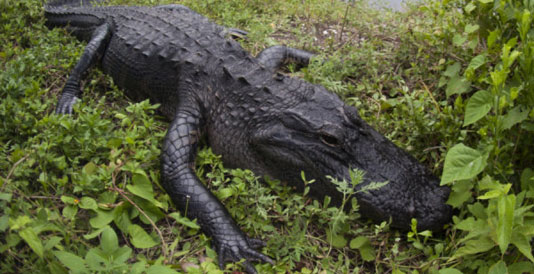 September 14, 2015 - South Florida is on the front lines in the war against invasive reptiles and amphibians because its warm climate makes it a place where they like to live, a new University of Florida study shows. Using computer models and data showing where reptiles live in Florida, UF/IFAS scientists predicted where they could find non-native species in the future. They found that as temperatures climb, areas grow more vulnerable to invasions by exotic reptiles. Conversely, they found that extreme cold temperatures protect against invasion.
September 14, 2015 - South Florida is on the front lines in the war against invasive reptiles and amphibians because its warm climate makes it a place where they like to live, a new University of Florida study shows. Using computer models and data showing where reptiles live in Florida, UF/IFAS scientists predicted where they could find non-native species in the future. They found that as temperatures climb, areas grow more vulnerable to invasions by exotic reptiles. Conversely, they found that extreme cold temperatures protect against invasion. "Early detection and rapid response efforts are essential to prevent more of the 140 introduced species from establishing breeding populations, and this study helps us choose where to look first," said Frank Mazzotti, a wildlife ecology and conservation professor at the University of Florida Institute of Food and Agricultural Sciences Fort Lauderdale Research and Education Center. The new study is published online in the journal Herpetological Conservation Biology. Lead author Ikuko Fujisaki, an assistant professor of wildlife ecology and conservation at the Fort Lauderdale REC, said scientists conducted the study to provide scientific data for managing invasive wildlife in the Sunshine State.
UF Press Release
Herpetological Conservation Biology Journal Article
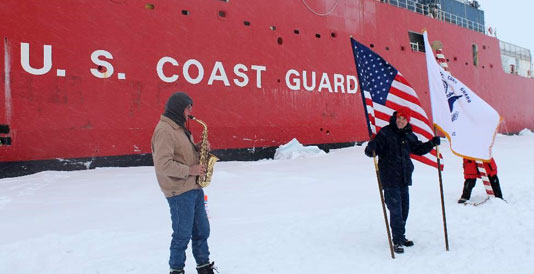 September 11, 2015 - Three Florida State University researchers are part of the scientific team on board a U.S. Coast Guard icebreaker that became the first American ship to make a solo trip to the North Pole. Professor of Chemical Oceanography William Landing, National High Magnetic Field Lab assistant scholar scientist Peter Morton, and post doctoral researcher Neil Wyatt are part of the 145 member crew and science party aboard the U.S. Coast Guard Cutter Healy, which left Alaska Aug. 9 for the North Pole. The expedition is in support of GEOTRACES, an international effort funded by the National Science Foundation to study the geochemistry of the world’s oceans. The data collected by scientists will be essential to understanding how the Arctic works.
September 11, 2015 - Three Florida State University researchers are part of the scientific team on board a U.S. Coast Guard icebreaker that became the first American ship to make a solo trip to the North Pole. Professor of Chemical Oceanography William Landing, National High Magnetic Field Lab assistant scholar scientist Peter Morton, and post doctoral researcher Neil Wyatt are part of the 145 member crew and science party aboard the U.S. Coast Guard Cutter Healy, which left Alaska Aug. 9 for the North Pole. The expedition is in support of GEOTRACES, an international effort funded by the National Science Foundation to study the geochemistry of the world’s oceans. The data collected by scientists will be essential to understanding how the Arctic works.FSU Press Release
Huffington Post Article
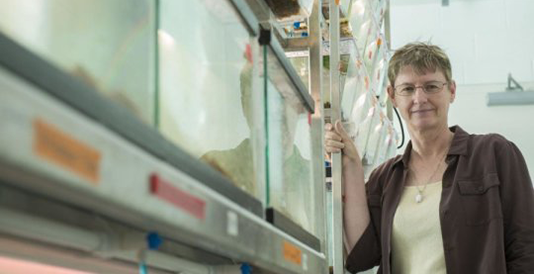 September 2, 2015 - A new Florida State University study is giving researchers a glimpse at how organisms from fish to flowers to tumors evolve in response to rapid environmental change. The findings could have a broad ripple effect on a number of research areas, including climate change and cancer treatment. And it's all because of guppies.
September 2, 2015 - A new Florida State University study is giving researchers a glimpse at how organisms from fish to flowers to tumors evolve in response to rapid environmental change. The findings could have a broad ripple effect on a number of research areas, including climate change and cancer treatment. And it's all because of guppies. FSU Professor of Biological Science Kimberly Hughes and a team of researchers set out to find how this tiny tropical fish would evolve if they transplanted wild Trinidadian guppy fish from a stream with predatory fish into two-predator-free streams. Because guppies reproduce multiple times in a year, they were able to track three to four generations of the fish living in a predator-free zone. The findings, published today in the academic journal Nature, were staggering.
By sequencing genetic material in the guppies' brains, researchers found that 135 genes evolved in response to the new environment. Most of the changes in the gene expression were internal and dealt with a fish's biological processes such as metabolism, immune function and development. But more importantly, the immediate response of genes to change in the environment did not reflect the eventual evolutionary change. Genes can change their activity levels in an immediate response to the environment -- what evolutionary biologists call plasticity -- or in an evolutionary response that occurs over many generations. What Hughes and her colleagues found was that the evolutionary change in gene activity was usually opposite in direction to the immediate plasticity of gene activity. A gene that had changed in response to drastic change in the environment would then evolve in the opposite direction after a few generations.
FSU Press Release
Nature Journal Article
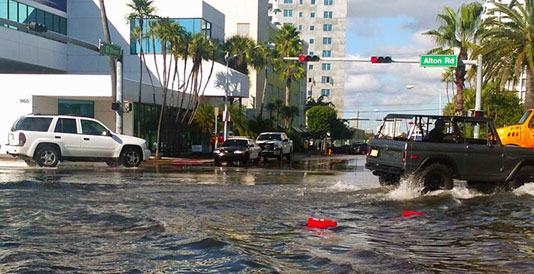 August 26, 2015 - A consortium of 14 U.S. academic institutions received a $12-million award from the National Science Foundation (NSF) to address challenges that threaten urban water systems in the United States and around the world. University of Miami (UM) Rosenstiel School of Marine and Atmospheric Science researchers David Letson and Kenny Broad are among the network’s principal investigators. The newly established Urban Water Innovation Network (UWIN), led by Colorado State University, will create technological, institutional, and management solutions to help communities increase the resilience of their water systems and enhance preparedness for responding to water crises. UM Rosenstiel School Professors of Marine Ecosystems and Society Letson and Broad will help design innovative technological solutions, such as green infrastructure, sustainable urban drainage networks, and floodplains that can enhance the sustainability of water systems across urban water systems and measure the impacts of these solutions.
August 26, 2015 - A consortium of 14 U.S. academic institutions received a $12-million award from the National Science Foundation (NSF) to address challenges that threaten urban water systems in the United States and around the world. University of Miami (UM) Rosenstiel School of Marine and Atmospheric Science researchers David Letson and Kenny Broad are among the network’s principal investigators. The newly established Urban Water Innovation Network (UWIN), led by Colorado State University, will create technological, institutional, and management solutions to help communities increase the resilience of their water systems and enhance preparedness for responding to water crises. UM Rosenstiel School Professors of Marine Ecosystems and Society Letson and Broad will help design innovative technological solutions, such as green infrastructure, sustainable urban drainage networks, and floodplains that can enhance the sustainability of water systems across urban water systems and measure the impacts of these solutions. UM Press Release
Photo credit: Credit: Arianna Prothero WLRN
August 25, 2015 - Wasting fresh water is a real concern. A recent study conducted with homeowners in central Florida found that, on average, 64 percent of the drinking water used by homes went to irrigation. In the summer months, this percentage increased to 88 percent. As the population increases, conservation of fresh water becomes increasingly important. The Special Issue Section of the current Technology and Innovation Journal of the National Academy of Inventors focuses on challenges to fresh water from environmental changes and from the human population. Florida homeowners—ready and willing to comply with government agency-imposed lawn watering restrictions—want to conserve water, although many are confused about how to conserve water. At the same time, many homeowners are also required to have perfect, green lawns or risk being penalized by their Home Owner's Associations (HOAs).
USF Press Release
Technology and Innovation Article
USF Press Release
Technology and Innovation Article
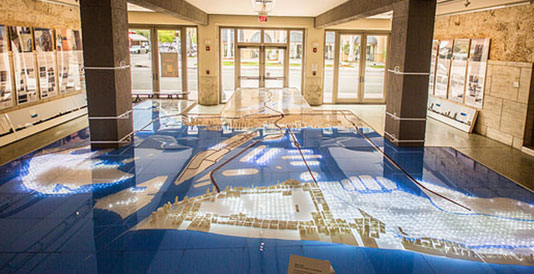 August 25, 2015 - With rising seas threatening coastal communities all across the world, Florida International University has launched the Sea Level Solutions Center to help people understand, adapt and persevere. FIU ecologist Tiffany Troxler will serve as director. The center combines expertise in the natural, physical and social sciences, along with architecture, engineering, computer sciences, law, communications, business, health and tourism management to develop long-term strategies in the face of rising seas. FIU’s Miami location will be key in advancing the center’s mission. South Florida is particularly vulnerable because of the large number of assets exposed to the effects of sea level rise.
August 25, 2015 - With rising seas threatening coastal communities all across the world, Florida International University has launched the Sea Level Solutions Center to help people understand, adapt and persevere. FIU ecologist Tiffany Troxler will serve as director. The center combines expertise in the natural, physical and social sciences, along with architecture, engineering, computer sciences, law, communications, business, health and tourism management to develop long-term strategies in the face of rising seas. FIU’s Miami location will be key in advancing the center’s mission. South Florida is particularly vulnerable because of the large number of assets exposed to the effects of sea level rise. "Rising seas are a topic of grave concern around the world, and most societies will feel the effects," said FIU President Mark B. Rosenberg. WWhile successful adaptation to sea level rise is local in nature, it will take international, national, regional, as well as local cooperation to develop and implement the necessary policies and strategies to address this global threat."
The FIU Sea Level Solutions Center will focus on envisioning and designing safe, resilient, prosperous and sustainable 22nd century coastal communities by focusing on the science behind the rising seas, preservation of governance systems, infrastructure challenges and solutions, business impacts, supply chain challenges, ecosystem dependencies, and personal assets. It will work with local governments, business and community leaders to accelerate adaption planning.
FIU Press Release

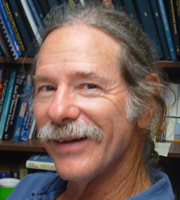 August 12, 2015 - Two Florida State University oceanography professors have been named fellows of the American Geophysical Union (AGU), a professional scientific organization representing scientists in 139 countries. Allan Clarke, the Adrian E. Gill Professor of Oceanography, and Jeffrey Chanton, the John Widmer Winchester Professor of Oceanography, were selected for the fellow designation by their peers in the organization for outstanding contributions to earth and space sciences.
August 12, 2015 - Two Florida State University oceanography professors have been named fellows of the American Geophysical Union (AGU), a professional scientific organization representing scientists in 139 countries. Allan Clarke, the Adrian E. Gill Professor of Oceanography, and Jeffrey Chanton, the John Widmer Winchester Professor of Oceanography, were selected for the fellow designation by their peers in the organization for outstanding contributions to earth and space sciences. Clarke focuses on understanding and predicting the El Niño/Southern Oscillation (ENSO). Generated by air/sea interaction in the central equatorial Pacific, ENSO is the major factor causing short-term climate variability on earth. Chanton focuses on the gas methane, which is an important trace gas produced by microbes involved in earth’s carbon cycle. It has led him to do work on climate change and more recently, the BP oil spill.
FSU Press Release
About the AGU Fellow Program
 August 11, 2015 - Florida State University is among nine universities who will share a $12 million grant from the National Science Foundation (NSF) to build a unique network of scientists, industry leaders and policy partners committed to building better cities. The network will include major metropolitan cities in the United States and India, infrastructure firms, and policy groups that will focus on ways to reimagine energy grids, road networks, green spaces and food and water systems. The research seeks to determine how cities can become more highly functional, better promote the health of residents and the environment, and be more desirable places to live and work — that intangible "vibe" known as livability. Funded by the NSF Sustainability Research Network program, the project, “Integrated Urban Infrastructure Solutions for Environmentally Sustainable, Healthy and Livable Cities,” will be anchored at the University of Minnesota and directed by Professor Anu Ramaswami. Florida State University’s lead investigator is Richard Feiock, the Jerry Collins Eminent Scholar of Public Administration and Policy in the Askew School within the College of Social Sciences and Public Policy.
August 11, 2015 - Florida State University is among nine universities who will share a $12 million grant from the National Science Foundation (NSF) to build a unique network of scientists, industry leaders and policy partners committed to building better cities. The network will include major metropolitan cities in the United States and India, infrastructure firms, and policy groups that will focus on ways to reimagine energy grids, road networks, green spaces and food and water systems. The research seeks to determine how cities can become more highly functional, better promote the health of residents and the environment, and be more desirable places to live and work — that intangible "vibe" known as livability. Funded by the NSF Sustainability Research Network program, the project, “Integrated Urban Infrastructure Solutions for Environmentally Sustainable, Healthy and Livable Cities,” will be anchored at the University of Minnesota and directed by Professor Anu Ramaswami. Florida State University’s lead investigator is Richard Feiock, the Jerry Collins Eminent Scholar of Public Administration and Policy in the Askew School within the College of Social Sciences and Public Policy. FSU Press Release
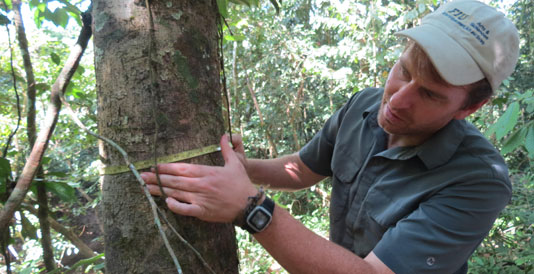 August 10, 2015 - Tropical forests in the Andes Mountains are changing in the face of climate change. A new study published in PNAS reveals the number of highland tree species is decreasing as a result of lowland tree species moving upslope along South America’s longest mountain chain in response to rising temperatures and changing rainfall patterns. Instead of shifting to different locations, the highland trees are retracting, or dying back. The results suggest tropical tree species in the Andes are at risk of extinction with ongoing warming. "The effects of climate change are everywhere – you can’t escape it," said Kenneth J. Feeley, a researcher in FIU’s Department of Biological Sciences and International Center for Tropical Botany (ICTB). "Some people hold the notion that the Amazon is an isolated and pristine ecosystem, immune to disturbances. We need to change our mindset and open our eyes to the fact that even in the middle of the Amazon or the remote Andes Mountains, species are at risk. Tropical forests, and the thousands of rare or endemic species they support, are highly sensitive to changes in climate and that they are perhaps some of the most threatened ecosystems of all. Climate change is pervasive and dangerous."
August 10, 2015 - Tropical forests in the Andes Mountains are changing in the face of climate change. A new study published in PNAS reveals the number of highland tree species is decreasing as a result of lowland tree species moving upslope along South America’s longest mountain chain in response to rising temperatures and changing rainfall patterns. Instead of shifting to different locations, the highland trees are retracting, or dying back. The results suggest tropical tree species in the Andes are at risk of extinction with ongoing warming. "The effects of climate change are everywhere – you can’t escape it," said Kenneth J. Feeley, a researcher in FIU’s Department of Biological Sciences and International Center for Tropical Botany (ICTB). "Some people hold the notion that the Amazon is an isolated and pristine ecosystem, immune to disturbances. We need to change our mindset and open our eyes to the fact that even in the middle of the Amazon or the remote Andes Mountains, species are at risk. Tropical forests, and the thousands of rare or endemic species they support, are highly sensitive to changes in climate and that they are perhaps some of the most threatened ecosystems of all. Climate change is pervasive and dangerous."FIU Press Release
PNAS Article
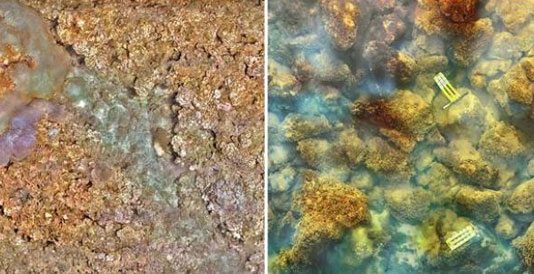 August 10, 2015 - Scientists from NOAA and the Cooperative Institute for Marine and Atmospheric Studies at the University of Miami have documented a dramatic shift from vibrant coral communities to carpets of algae in remote Pacific Ocean waters where an underwater volcano spews carbon dioxide. The new research published online August 10 in Nature Climate Change provides a stark look into the future of ocean acidification – the absorption by the global oceans of increasing amounts of human-caused carbon dioxide emissions. Scientists predict that elevated carbon dioxide absorbed by the global oceans will drive similar ecosystem shifts, making it difficult for coral to build skeletons and easier for other plants and animals to erode them.
August 10, 2015 - Scientists from NOAA and the Cooperative Institute for Marine and Atmospheric Studies at the University of Miami have documented a dramatic shift from vibrant coral communities to carpets of algae in remote Pacific Ocean waters where an underwater volcano spews carbon dioxide. The new research published online August 10 in Nature Climate Change provides a stark look into the future of ocean acidification – the absorption by the global oceans of increasing amounts of human-caused carbon dioxide emissions. Scientists predict that elevated carbon dioxide absorbed by the global oceans will drive similar ecosystem shifts, making it difficult for coral to build skeletons and easier for other plants and animals to erode them.NOAA Press Release
Nature Climate Change Article
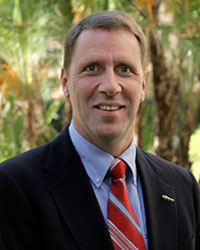 August 4, 2015 - Florida Sea Grant director Karl Havens (University of Florida) has been confirmed as a member of a National Academy of Sciences committee that evaluates progress on the Comprehensive Everglades Restoration Plan, the multibillion-dollar effort underway in south Florida to restore historic water flows to the Everglades. As a member of the Committee on Independent Scientific Review of Everglades Restoration Progress, or CISRERP, Havens will join an ongoing panel of 13 other prominent scientists from across the U.S. tasked with monitoring progress toward Everglades restoration and assessing scientific or engineering issues that may hinder the effort.
August 4, 2015 - Florida Sea Grant director Karl Havens (University of Florida) has been confirmed as a member of a National Academy of Sciences committee that evaluates progress on the Comprehensive Everglades Restoration Plan, the multibillion-dollar effort underway in south Florida to restore historic water flows to the Everglades. As a member of the Committee on Independent Scientific Review of Everglades Restoration Progress, or CISRERP, Havens will join an ongoing panel of 13 other prominent scientists from across the U.S. tasked with monitoring progress toward Everglades restoration and assessing scientific or engineering issues that may hinder the effort.Florida Sea Grant Announcement
 August 3, 2015 - South Florida’s predisposition to weather extremes renders the region’s infrastructure acutely vulnerable. But weather extremes are not exclusive to South Florida. The NSF-funded Urban Resilience to Extreme Weather-Related Events Sustainability Research Network (UREx SRN), a newly formed team of researchers, is addressing these challenges on an international scale. FIU biologists Evelyn Gaiser, John Kominoski and Tiffany Troxler are part of the 50-member team of researchers. Hurricanes, flooding, droughts, heat waves and other extreme events can cripple crucial infrastructure that enables transit, electricity, water and other services in urban areas. With these types of events becoming more common, it is increasingly important to develop infrastructure in different, more sustainable ways. Representing 15 institutions from nine cities in North and South America, the researchers will evaluate the social, ecological and technical systems related to infrastructure. Their efforts will take into account key stakeholders, including citizens who rely on the infrastructure and city officials, as well as the natural environment in which the infrastructure operates. The team will evaluate available technology and develop a suite of tools to support the development of urban infrastructure that is resilient and tailored to particular cities.
August 3, 2015 - South Florida’s predisposition to weather extremes renders the region’s infrastructure acutely vulnerable. But weather extremes are not exclusive to South Florida. The NSF-funded Urban Resilience to Extreme Weather-Related Events Sustainability Research Network (UREx SRN), a newly formed team of researchers, is addressing these challenges on an international scale. FIU biologists Evelyn Gaiser, John Kominoski and Tiffany Troxler are part of the 50-member team of researchers. Hurricanes, flooding, droughts, heat waves and other extreme events can cripple crucial infrastructure that enables transit, electricity, water and other services in urban areas. With these types of events becoming more common, it is increasingly important to develop infrastructure in different, more sustainable ways. Representing 15 institutions from nine cities in North and South America, the researchers will evaluate the social, ecological and technical systems related to infrastructure. Their efforts will take into account key stakeholders, including citizens who rely on the infrastructure and city officials, as well as the natural environment in which the infrastructure operates. The team will evaluate available technology and develop a suite of tools to support the development of urban infrastructure that is resilient and tailored to particular cities.FIU Press Release
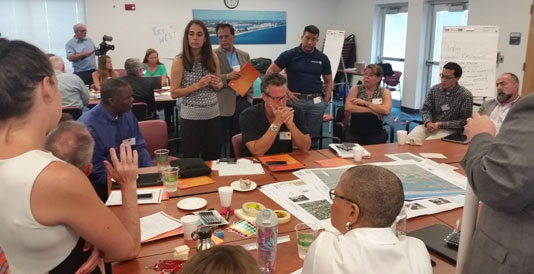 July 31, 2015 - On July 20-22, the Southeast Florida Regional Climate Change Compact held its second Resilient Redesign in partnership with FCI universities UF, UM, FIU and FAU. The FAU Davie campus hosted the event with over 55 participants who gathered with the goal of developing solutions for sites in Key West, Hollywood and Delray Beach, FL, each with their own unique characteristics and challenges. Participants came from the private sector, public sector and academia. The group was divided in city teams to develop potential options for the sites. On Wednesday, July 22, the teams presented to an audience of over 80 attendees. Solutions included renewal of wetlands, elevated co-housing options, living with water, elevation of infrastructure, off the grid solutions and changes in land use. Presentations will be shared again at the Southeast Florida Regional Climate Leadership Summit to be held December 1-3 in Key West. Cities will be sharing the concepts with their leadership at upcoming commission meetings.
July 31, 2015 - On July 20-22, the Southeast Florida Regional Climate Change Compact held its second Resilient Redesign in partnership with FCI universities UF, UM, FIU and FAU. The FAU Davie campus hosted the event with over 55 participants who gathered with the goal of developing solutions for sites in Key West, Hollywood and Delray Beach, FL, each with their own unique characteristics and challenges. Participants came from the private sector, public sector and academia. The group was divided in city teams to develop potential options for the sites. On Wednesday, July 22, the teams presented to an audience of over 80 attendees. Solutions included renewal of wetlands, elevated co-housing options, living with water, elevation of infrastructure, off the grid solutions and changes in land use. Presentations will be shared again at the Southeast Florida Regional Climate Leadership Summit to be held December 1-3 in Key West. Cities will be sharing the concepts with their leadership at upcoming commission meetings.
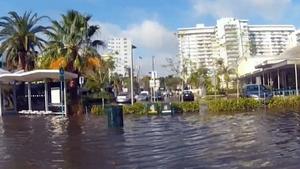 July 27, 2015 - Scientists at the University of South Florida's College of Marine Science investigating the increasing risk of 'compound flooding' for major U.S. cities have found that flooding risk is greatest for cities along the Atlantic and Gulf coasts when strong storm surge and high rainfall amounts occur together. While rising sea levels are the main driver for increasing flood risk, storm surges caused by weather patterns that favor high precipitation exacerbates flood potential. The paper describing their research on the causes of compound flooding in urban areas of the U.S will appear in Nature Climate Change. "Nearly 40 percent of the U.S. population resides in coastal counties," said study lead author Thomas Wahl of the University of South Florida College of Marine Science and the University of Siegen in Germany. "Flooding can have devastating impacts for these low-lying, densely populated and heavily developed regions and have wide-ranging social, economic and environmental consequences."
July 27, 2015 - Scientists at the University of South Florida's College of Marine Science investigating the increasing risk of 'compound flooding' for major U.S. cities have found that flooding risk is greatest for cities along the Atlantic and Gulf coasts when strong storm surge and high rainfall amounts occur together. While rising sea levels are the main driver for increasing flood risk, storm surges caused by weather patterns that favor high precipitation exacerbates flood potential. The paper describing their research on the causes of compound flooding in urban areas of the U.S will appear in Nature Climate Change. "Nearly 40 percent of the U.S. population resides in coastal counties," said study lead author Thomas Wahl of the University of South Florida College of Marine Science and the University of Siegen in Germany. "Flooding can have devastating impacts for these low-lying, densely populated and heavily developed regions and have wide-ranging social, economic and environmental consequences."USF Press Release
Nature Climate Change Journal Article
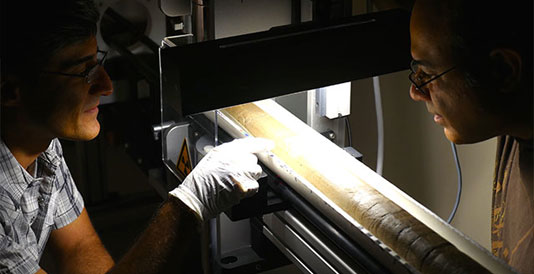 July 23, 2015 - New research reveals that some of the earliest civilizations in the Middle East and the Fertile Crescent may have been affected by abrupt climate change. These findings show that while socio-economic factors were traditionally considered to shape ancient human societies in this region, the influence of abrupt climate change should not be underestimated. A team of international scientists led by researchers from the University of Miami (UM) Rosenstiel School of Marine and Atmospheric Science found that during the first half of the last interglacial period known as the Holocene epoch, which began about 12,000 years ago and continues today, the Middle East most likely experienced wetter conditions in comparison with the last 6,000 years, when the conditions were drier and dustier.
July 23, 2015 - New research reveals that some of the earliest civilizations in the Middle East and the Fertile Crescent may have been affected by abrupt climate change. These findings show that while socio-economic factors were traditionally considered to shape ancient human societies in this region, the influence of abrupt climate change should not be underestimated. A team of international scientists led by researchers from the University of Miami (UM) Rosenstiel School of Marine and Atmospheric Science found that during the first half of the last interglacial period known as the Holocene epoch, which began about 12,000 years ago and continues today, the Middle East most likely experienced wetter conditions in comparison with the last 6,000 years, when the conditions were drier and dustier. UM Press Release
Quaternary Science Reviews Journal Article
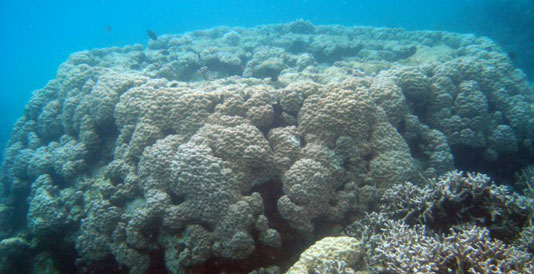 July 22, 2015 - The coral reefs that have protected Pacific Islanders from storm waves for thousands of years could grow rapidly enough to keep up with escalating sea levels if ocean temperatures do not rise too quickly, according to a new study from Florida Institute of Technology. The study, published Wednesday in the journal Royal Society Open Science, provides the first evidence that well-managed reefs will be able to keep up with sea-level rise through vertical growth. But that can happen only if carbon dioxide levels in the atmosphere stay below 670 parts-per million (ppm). Carbon dioxide is the principal greenhouse gas responsible for most of global warming, which in turn increases ocean temperatures. Today, the level of carbon dioxide is 400 ppm. Beyond 670 ppm – which represents a 3.5 degree Fahrenheit ocean temperature increase and could be reached within the next 100 years – even healthy reefs will not be able keep up. "Reefs will continue to keep up with sea-level rise if we reduce our emission of greenhouse gases," said Florida Tech’s Rob van Woesik, a professor in the Department of Biological Sciences. "If reefs lose their capacity to keep up with sea-level rise they will drown."
July 22, 2015 - The coral reefs that have protected Pacific Islanders from storm waves for thousands of years could grow rapidly enough to keep up with escalating sea levels if ocean temperatures do not rise too quickly, according to a new study from Florida Institute of Technology. The study, published Wednesday in the journal Royal Society Open Science, provides the first evidence that well-managed reefs will be able to keep up with sea-level rise through vertical growth. But that can happen only if carbon dioxide levels in the atmosphere stay below 670 parts-per million (ppm). Carbon dioxide is the principal greenhouse gas responsible for most of global warming, which in turn increases ocean temperatures. Today, the level of carbon dioxide is 400 ppm. Beyond 670 ppm – which represents a 3.5 degree Fahrenheit ocean temperature increase and could be reached within the next 100 years – even healthy reefs will not be able keep up. "Reefs will continue to keep up with sea-level rise if we reduce our emission of greenhouse gases," said Florida Tech’s Rob van Woesik, a professor in the Department of Biological Sciences. "If reefs lose their capacity to keep up with sea-level rise they will drown."FIT Press Release
Royal Society Open Science Journal Article
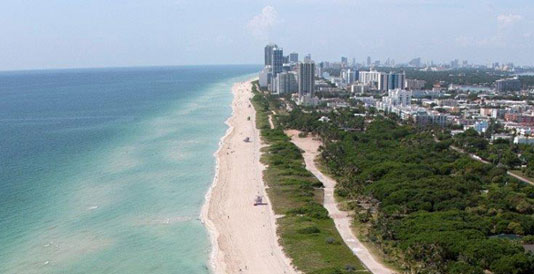 July 22, 2015 - The White House’s Council on Environmental Quality named Florida International University (FIU) as the host for its first Federal Emergency Management Agency (FEMA) seminar on developing locally relevant exercises supporting community resilience to climate change. The seminar will focus on climate adaptation, preparedness and resilience.
July 22, 2015 - The White House’s Council on Environmental Quality named Florida International University (FIU) as the host for its first Federal Emergency Management Agency (FEMA) seminar on developing locally relevant exercises supporting community resilience to climate change. The seminar will focus on climate adaptation, preparedness and resilience.The news of FIU’s selection follows months of active advocacy by the university’s Sea Level Solutions Center targeting increased federal attention to South Florida and promoting FIU’s own strengths in climate change research and environmental resilience engagements.
South Florida serves as ground zero for climate change in the United States and FIU scientists have predicted sea levels to rise by 9 to 24 inches by 2060. The seminar is set to take place September 21-22 at the FIU campus in Miami. The White House issued a press release on actions to build resilience to climate change and more detail on FIU’s partnership with FEMA.
FIU Press Release
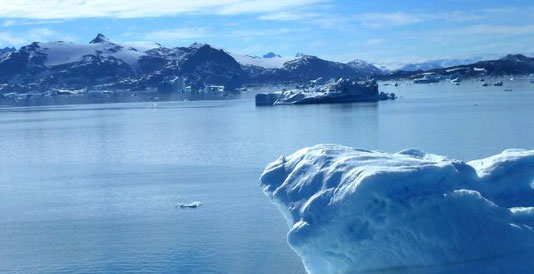 July 9, 2015 - When past temperatures were similar to or slightly higher than the present global average, sea levels rose at least 20 feet, suggesting a similar outcome could be in store if current climate trends continue. Findings published in the journal Science showed that the seas rose in response to melting ice sheets in Greenland and Antarctica, said lead author Andrea Dutton, a University of Florida geochemist. “This evidence leads us to conclude that the polar ice sheets are out of equilibrium with the present climate,” she said. Dutton and an international team of scientists assessed evidence of higher sea levels during several periods to understand how polar ice sheets respond to warming. Combining computer models and observations from the geologic record, they found that during past periods with average temperatures 1 to 3 °C (1.8 to 5.4 °F) warmer than preindustrial levels, sea level peaked at least 20 feet higher than today.
July 9, 2015 - When past temperatures were similar to or slightly higher than the present global average, sea levels rose at least 20 feet, suggesting a similar outcome could be in store if current climate trends continue. Findings published in the journal Science showed that the seas rose in response to melting ice sheets in Greenland and Antarctica, said lead author Andrea Dutton, a University of Florida geochemist. “This evidence leads us to conclude that the polar ice sheets are out of equilibrium with the present climate,” she said. Dutton and an international team of scientists assessed evidence of higher sea levels during several periods to understand how polar ice sheets respond to warming. Combining computer models and observations from the geologic record, they found that during past periods with average temperatures 1 to 3 °C (1.8 to 5.4 °F) warmer than preindustrial levels, sea level peaked at least 20 feet higher than today.UF Press Release
Science Journal Article












